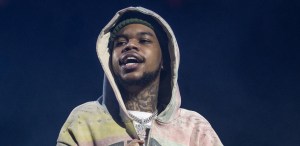Netflix is remarkably successful and gets all kinds of praise, far and wide. It seems like every single show they drop gets some kind of buzz, but that buzz is not always the good kind. The streaming service is known to garner stellar reviews and dedicated fan reception, but they sometimes drop the ball and greenlight questionable premises or let questionable behind-the-scenes practices and legal issues muck things up.
Shows have dealt with stars accused of terrible crimes, glaring pay disparity disputes, representation issues and political controversy in recent years, with the fallout often bringing about major changes behind-the-scenes. Scroll through to see some of Netflix‘s most controversial shows over the years.
Videos by PopCulture.com
’13 Reasons Why’

13 Reasons Why was one of Netflix’s biggest successes, but it also led to one of the service’s biggest controversies. The show’s entire premise centers around the suicide of a teenage girl, Hannah Baker (Katherine Langford). Before her death, she recorded a series of tapes explaining why she killed herself to each of the people responsible for inflicting emotional damage on her.
Many interpreted the message of the show as suicide being a fitting way to get revenge on people and deal with a problem. There were even some copycat deaths blamed on the show, but Netflix still kept the show going.
‘The Ranch’

The Ranch is one of Netflix’s most successful sitcoms, but it was struck with a load of controversy. Danny Masterson, who plays lead character Rooster Bennett, was accused of sexual assault by numerous women. Masterson denied the allegations, but Netflix decided to cut ties with the actor. If the accusations and firing were not controversial enough, the service decided to air episodes filmed before Masterson’s firing without editing him out at all. The show finished its run without ever bring Masterson back.
‘House of Cards’

House of Cards was marred with similar issues in late 2017. Star Kevin Spacey, who played main character Frank Underwood, was accused of countless sexual assault and harassment crimes. Netflix was forced to act, firing Spacey and overhauling the show’s final season to be all about Frank’s wife Claire (Robin Wright).
‘Dear White People’

Dear White People is acclaimed and adored by critics and fans alike, but many people attacked the show based on its title alone. While the show is all about racial commentary and tackling appropriation of black culture, most people took the show’s premise as a racist attack at white people without ever watching an episode.
‘Insatiable’

Insatiable starred Jessie alum Debby Ryan as “Fatty Patty,” a high school student repeatedly teased and bullied for being overweight. Patty is then attacked by someone and is forced to have her jaw wired shut for months. With Patty’s jaw wired shut, her diet drastically changes and her weight disappears over summer vacation. She comes back to school revitalized and out for revenge on everyone who bullied her.
Based on the trailer alone, numerous Twitter users were up-in-arms over the underlying themes of the series when it was released. Many pointed to that fact that could lead impressionable viewers to believe they have to starve themselves to lose weight and gain social acceptability.
‘The Crown’

Fact-checking issues aside, The Crown seems like an unlikely target for a scandal, but it found itself at the center of a discussion about equal wages. After their two-season stints on the show ended, it was revealed that co-lead Matt Smith was paid much more than Claire Foy, who played the main character of Queen Elizabeth.
Many demanded that Netflix and the show’s producers pay the actress more retroactively or make a large donation to the Time’s Up movement. It is unclear if they did either of those things, but producers vowed that future actresses who play the Queen Elizabeth on the show will not be paid less than any other star.
‘Atypical’

Atypical is a show meant to give better representation to people with autism. However, it seemed to not dig into an authentic autistic experience. Many people in the autism community, including Huffington Post contributor Haley Moss, heavily criticized the show for this.
“Nobody is a perfect stereotype in real life,” Moss wrote in her review. “Sam simply misses every social cue, finds every excuse possible to talk about penguins and Antarctica, and appears inherently selfish and inconsiderate. He becomes the joke. He knows he’s weird, and he doesn’t really care, except when it comes to his quest to have a girlfriend and have sex. He ignores people’s feelings, and every line of dialogue he has somehow involves a social misstep.”
She continues, “With autism, it isn’t always this obvious, and at least for me, the awkward moments and miscues are more nuanced. These stereotypes are damaging to autistic people, their families, and their friends. Instead of helping us, the show hurts us by falsely portraying us as creepy, insensitive, and just really awkward. “
‘Sacred Games’

Netflix’s first Indian original series, Sacred Games, stirred up types of legal issues the streaming service was probably not expecting. Late Prime Minister Rajiv Gandhi is referred to as “fattu,” an insult translated as “p—y.” Upon the show’s release, Kolkata politician Rajeev Kumar Sinha of the opposition Congress party filed a police complaint against Netflix and the actor who delivered the line, Nawazuddin Siddiqui.
“The use of abusive language is not justified. I don’t think we can go back into history and abuse people this way,” Sinha told TIME. However, Sinha withdrew the complaint after Rahul Gandhi, Gandhi’s son and president of the Congress party, stood up for the series and the right for freedom of expression.
‘Big Mouth’

Netflix has had its fair share of adult animated series, but none as risqué as Nick Kroll’s Big Mouth, which took a considerable risk with the subject matter. As a deep examination of puberty and teen sex, the animated show tilts heavily on vulgarity and gross-out humor. Despite the content, some critics have found Big Mouth to be sharp, witty and engaging, as others have considered its utter commitment to nastiness taking things too far.
In addition to Kroll making references to homosexuality and pedophilia, the series also managed to draw in some criticism over its voice choice in actress, Jenny Slate — a white actress cast as a Black character. However, that creative choice has been corrected, with Ayo Edebiri now voicing the character as of Season 4’s final episodes.








